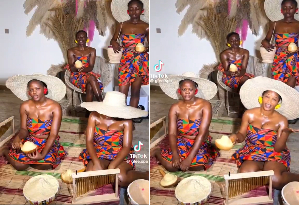Inerela+ Ghana, a Non-Governmental Organisation, has organised a sensitisation programme on life management skills for 30 teenage girls at Chorkor Chemuena, a community in Accra.
The objective is to empower the teens with adequate knowledge for self-protection against unwanted pregnancies, Sexually Transmitted Diseases (STIs), Sexual and Gender-Based Violence (SGVB) and the cycle of poverty among other social and health challenges that had plagued their community for many years.
The platform, will also create an opportunity for the beneficiaries to share their experiences and knowledge on SGBV including rape and incest, and benefit from further education on available legal and support programmes for both perpetrators and victims of such abuses.
Madam Mercy Acquah-Hayford, the National Coordinator, Inerela+ Ghana, said the Chorkor Chemuena community shared similar challenges with the James Town, Nima and other densely populated societies in the Greater Accra region, hence the resolve of the Organisation to adopt strategies in collaboration with their leadership, to address the problems through changing of the mindset of the people with information.
“It has been realised that majority of young girls living in these communities become pregnant, they drop out of school, are abandoned by the males who impregnated them, while their families also disown them leaving these poor girls in more devastating states,” she said.
The National Coordinator said much progress had, however, been made since the programme was introduced in the James Town and Nima areas with positive testimonies being recorded in terms of the rate of teenage pregnancies and SGBV because boys and men were made active ambassadors of the entire programme.
Madam Acquah-Hayford encouraged the beneficiaries to remain committed as a group so they could also benefit from a planned life skills training as their counterparts in the other beneficiary communities, to help improve their lives and break the cycle of poverty in their generation.
Ms Paulina Louisa Essel, the Deputy Chief Registrar at the Commission on Human Rights and Administrative Justice (CHRAJ), who is also a Counselling Psychologist, advised the females to “stop covering up for the criminals who abuse them,” and urgently report all cases of rape, incest and other forms of domestic violence to the Domestic Violence and Victim Support Unit (DOVVSU) and other law enforcement authorities for action.
“You must stop treating rape and incest as family issues because they are against the laws of Ghana,” she said.
Ms Essel said because the majority of the crimes had for many years gone unpunished, their perpetration had to gain deeper roots within communities and called for all hands on deck, with strengthened partnerships with community leaders and parents to intensify efforts at addressing the menace.
She attributed the originality of some of the challenges faced by teenagers to dysfunctional families including; broken homes, single parenting, alcoholism and peer pressure, which opened girls to vulnerabilities with dire consequences on both their health and that of their unborn children.
Ms Essel encouraged parents of teenagers to cultivate habits of befriending their children, especially adolescents to help them go through the challenging human development stage in life to safeguard their lives against unwanted pregnancies, waywardness, and engaging in social vices and habits such as drug abuse, alcoholism and hooliganism.
She said early sexual escapades by teenagers apart from unwanted pregnancies, could lead to STIs such as HIV and AIDS, syphilis, and even death through illegal abortion or suicide due to depression, or severe complications at childbirth leading to poor health of babies, which impacted negatively on the socio-economic development of the nation.
Ms Essel encouraged teenagers to report all STIs to the hospitals for immediate and proper treatment and talk about menstrual hygiene and proper virginal care to prevent infections that could adversely impact fertility.
Naa Maana Afresu I, the Chemuena Maanye (Queen-mother), thanked the Organisation for the support and pledged her full commitment towards its success.
Regional News of Saturday, 1 May 2021
Source: GNA













